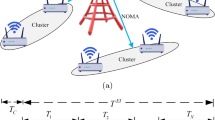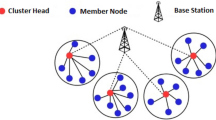Abstract
With the concept of “Cognitive Sense of China” and “Smart Planet” proposed, wireless sensor networking is considered to be one of the most important technologies of the new century. In wireless sensor networks, how to extend battery lifetime is a core problem. In this paper, we address the problem of designing battery-friendly packet transmission policies for wireless sensor networks. Our objective is to maximize the lifetime of batteries for wireless sensor nodes subject to certain delay constraints. We present three packet transmission schemes and evaluate them with respect to battery performance. The first scheme, based on combining multiple packets, utilizes battery charge recovery effect, which allows some charge to be recovered during long idle periods. The second scheme, based on a modified version of lazy packet scheduling, draws smoother and lower current and is battery efficient. The final scheme, based on a combination of the two previous schemes has superior battery performance at the expense of larger average packet delay. All three schemes are simulated for a wireless network framework with internet traffic, and the results were validated.
Similar content being viewed by others
References
Park S, Savvides A, Srivastava MB. Battery capacity measurement and analysis using lithium coin cell battery. In: Proc. ISLPED, Aug. 2001, 382–387
Kim J, Lee S, Cho B. Discrimination of battery characteristics using discharging/charging voltage pattern recognition. In: IEEE Conf. on Energy conversion congress and exposition, Sept. 2009, 1799–1805
Rakhmatov D. Modeling and optimization of energy supply and demand for portable reconfigurable electronic systems. Ph.D Dissertation, The University of Arizona, 2002
Rakhmatov D, Vrudhula S, Wallach D A. A model for battery lifetime analysis for organizing applications on a pocket computer. IEEE Trans. Very Large Scale Integration (VLSI) Systems, 2003, 11(6): 1019–1030
Kroeze R C, Krein P T. Electrical battery model for use in dynamic electric vehicle simulations. In: Proc. PESC 2008, June 2008, 1336–1342
Chiasserini C F, Rao R R. Energy efficient battery management. In: Proceedings of Infocom 2000, Tel Aviv, 2001, 396–403
Zhang J C, Ci S, Sharif H, Alahmad M. An enhanced circuit-based model for single-cell battery. In: IEEE Applied power electronics conference and exposition, Feb. 2010, 672–675
Ma C, Yang Y. A battery aware scheme for energy efficient coverage and routing in wireless mesh networks. In: Proceedings of GLOBECOM’07, Nov. 2007, 1113–1117
Padmanabh K, Roy R. Maximum lifetime routing in wireless sensor network using realistic battery model. In: Proceedings of HPSR’06, Jun. 2006, 155–160
Chowdhury P, Chakrabarti C. Static task-scheduling algorithms for battery-powered DVS systems. IEEE Trans. Very Large Scale Integration (VLSI) Systems, 2005, 13(2): 226–237
Luo J, Jha N K. Battery-aware static scheduling for distributed real-time embedded system. In: Proceedings of DAC 2001, 444–449
Lahiri K, Dey S., Raghunathan A. Communication based power management. Design&Test of Computers, IEEE, 2002, 19(4): 118–130
Jayashree S, Manoj B S, Murthy C S R. Next step in MAC evolution: battery awareness? In: Proceedings of GLOBECOM’04, Dec. 2004, 2786–2790
Chiasserini C F, Rao R R. Improving battery performance by using traffic shaping techniques. IEEE Journal on Selected Areas in Communications, 2001, 19(7): 1385–1394
Chiasserini C F, Rao R R. A traffic control scheme to optimize the battery pulsed discharge. In: Proceedings of MILCOM 1999, 2: 1419–1423
Nuggehalli P, Srinivasan V, Rao R R. Energy efficient transmission scheduling for delay constrained wireless networks. IEEE Trans. On Wireless Communications, 2006, 5(3): 531–539
Prabhakar B, Biyikoglu E U, Gamal A E. Energy-efficient transmission over a wireless link via lazy packet scheduling. In: Proceedings of INFOCOM 2001, Apr. 2001, 386–394
Cho S H, Chandrakasan A P. Energy efficient protocols for low duty cycle wireless microsensor networks. In: Proceedings of ICASSP’01, vol.4, May 2001, 2041–2044
Li Y, Chakrabarti C. Packet transmission policies for battery operated communication systems. In: Proceedings of SIPS 2004, 71–76
Brooks D, Tiwari V, Martonosi M. Wattch: a framework for architectural-level power analysis and optimizations. Computer Architecture, 2000, 83–94
Author information
Authors and Affiliations
Corresponding author
Rights and permissions
About this article
Cite this article
Li, Y., Li, H., Zhang, Y. et al. Packet transmission policies for battery operated wireless sensor networks. Front. Comput. Sci. China 4, 365–375 (2010). https://doi.org/10.1007/s11704-010-0386-7
Received:
Accepted:
Published:
Issue Date:
DOI: https://doi.org/10.1007/s11704-010-0386-7




